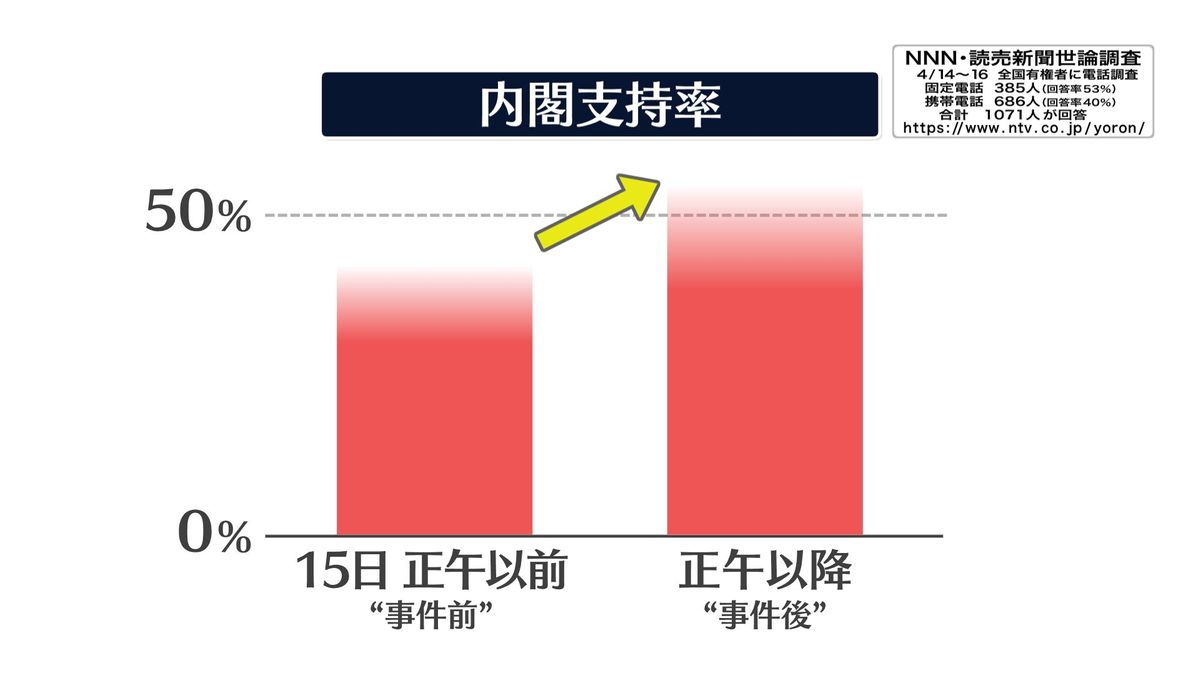6 安全保障政策
戦争\(=\)
- 利害対立
- 現状変更/現状維持
- 外交の失敗
- 情報の非対称性
- コミットメント問題
\(\leadsto\)安全保障政策\(=\)これらの要因を解消すること
\(\leadsto\)地域や時代ごとの紛争の偏り
6.1 力による平和
6.1.1 抑止の能力
バランシング:内的・外的
\[ \textrm{現状変更を望む国家Aの戦争の利益}=w - c_A \]
- 勢力均衡 (balance of power)
- 勢力優位 (preponderance of power)
- 権力移行 (transition of power)
現状の利益配分/国力の分布


国力?
- 軍事費(ストックホルム国際平和研究所[Stockholm International Peace Research Institute: SIPRI])
- 資源(Corralates of WarのComposite Index of National Capability(CINC))
- 軍人数、軍事費、鉄鋼生産量、エネルギー消費量、総人口、都市部人口
- 権力の相対性、関係性
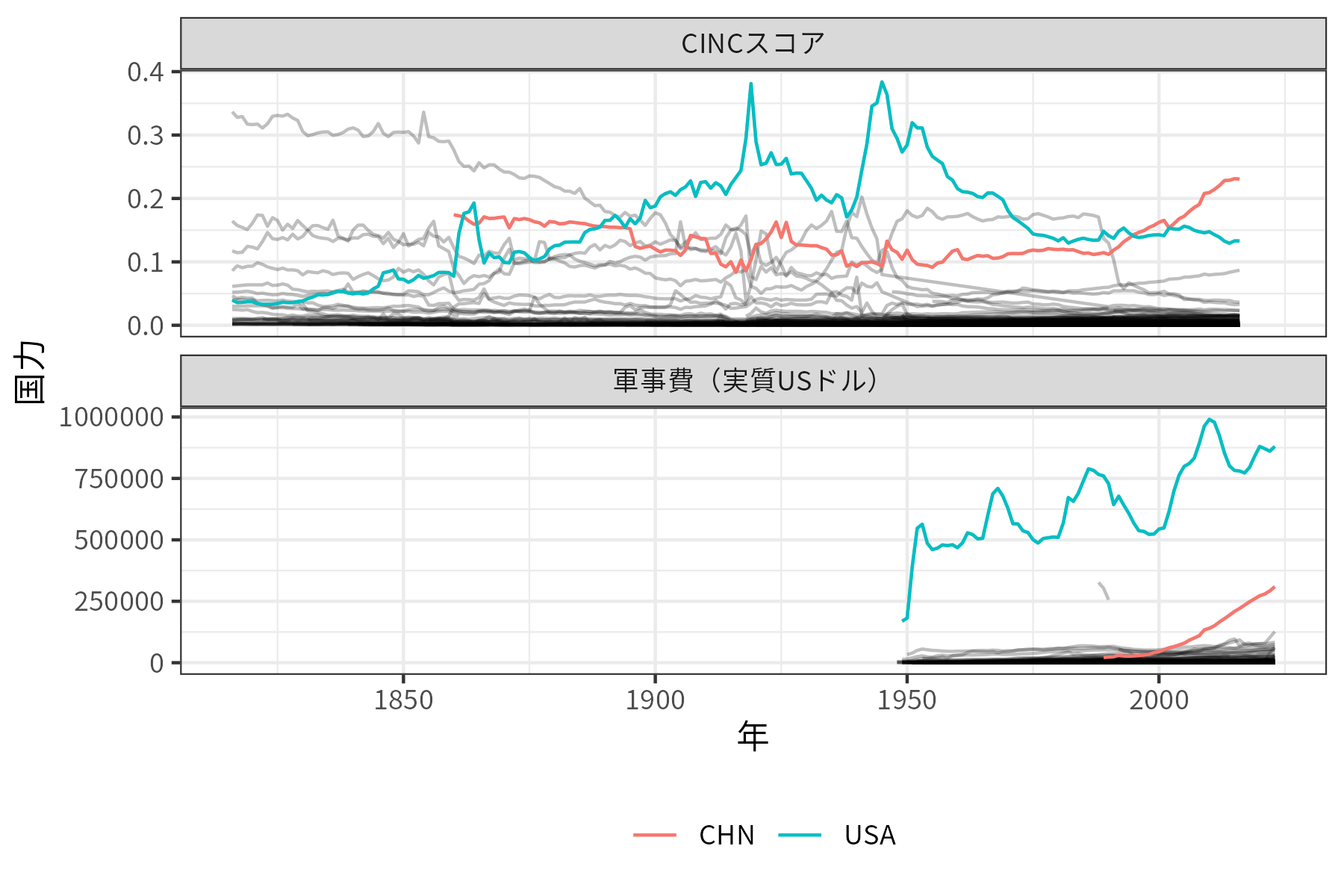
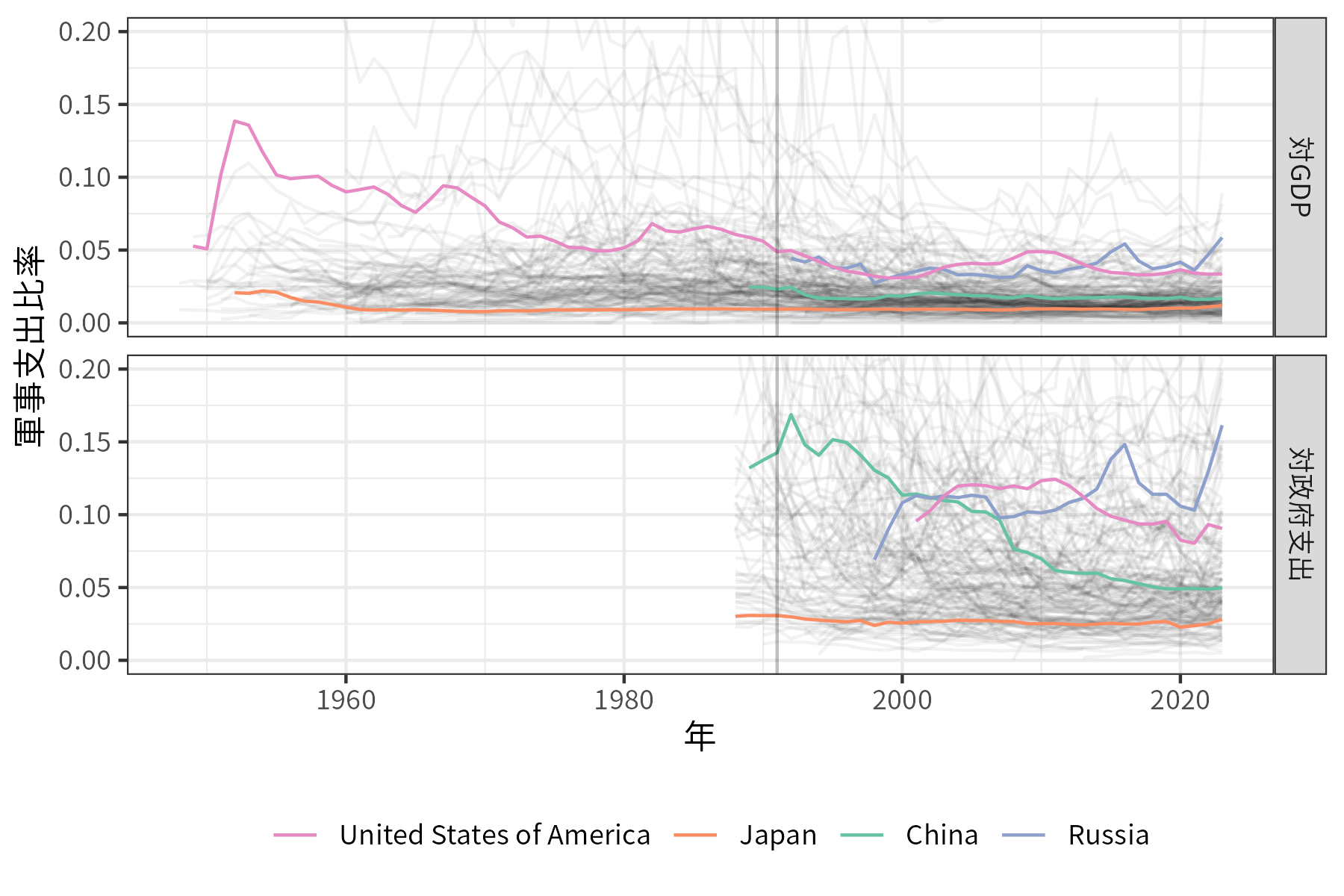
6.1.2 抑止の信憑性
\[ \textrm{現状維持を望む国家Bの戦争の利益}= 1-w - c_B \]
- ロックイン
- 埋没費用
抑止力\(=\)抑止の能力\(\times\)抑止の信憑性
- 暴力asコミュニケーション
6.1.3 安全保障のジレンマ
先制攻撃\(\leadsto\)安心供与の破綻
安全保障のジレンマ(Jervis 1978):安全保障のための政策\(\leadsto\)安全保障環境の悪化
- 軍拡競争?
スパイラル・モデル:抑止力の拡大\(\leadsto\)戦争?(Slantchev 2003)
- 攻撃・防御バランス
費用のかかる平和(costly peace)?
6.1.4 同盟
Alliance Treaty Obligations and Provisions (ATOP) のデータセット(B. Leeds ほか 2002)
An alliance is a formal agreement among independent states to cooperate militarily in the face of potential or realized military conflict.

拡大抑止 (extended deterrence)
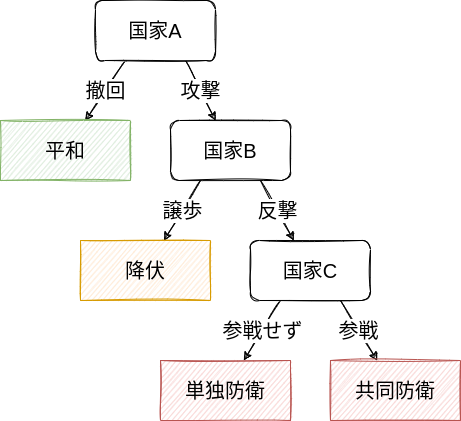
- 見捨てられる恐怖
- 評判費用 (reputation cost)/観衆費用 (audience cost)\(\leadsto\)手を縛る (tying hands)
- 埋没費用 (sunk cost)
- 仕掛線 (trip wire)
- 巻き込まれる恐怖
拡大抑止の効果
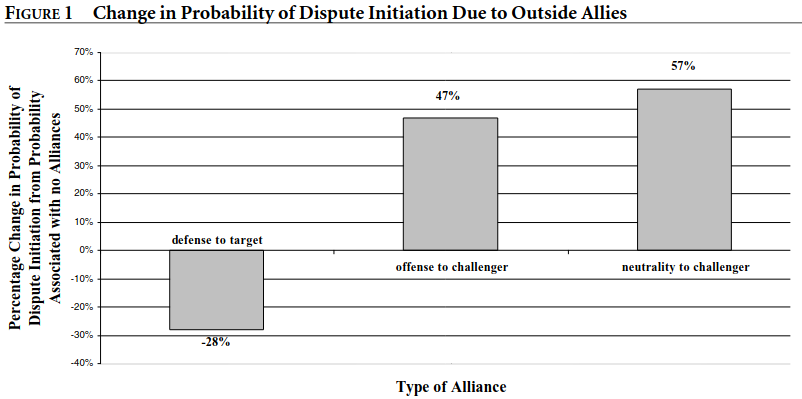
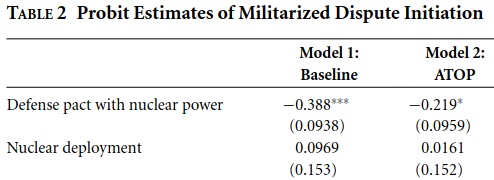
見捨てられる可能性
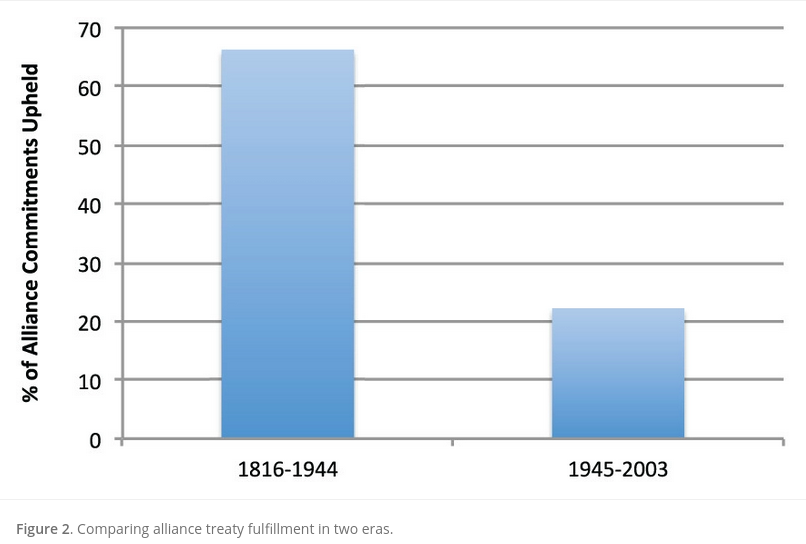
6.1.5 軍事力の限界
軍事力は平和の基礎:利益と軍事力の配分の一致\(\leadsto\)平和
軍備拡大\(\leadsto\)平和?
リベラルな平和/カント的平和(Oneal と Russet 1997; Oneal と Russett 1999)1/リベラル国際秩序 (liberal international order: ILO) (Ikenberry 2009, 2018)?
- 制度(国際法)による平和
- 民主主義による平和
- 経済的相互依存(例、貿易や投資)による平和
6.2 国際制度による平和
6.2.1 戦争の違法化
国際連合 (the United Nations)/武力行使禁止原則
すべての加盟国は、その国際紛争を平和的手段によって国際の平和及び安全並びに正義を危くしないように解決しなければならない。
すべての加盟国は、その国際関係において、武力による威嚇又は武力の行使を、いかなる国の領土保全又は政治的独立に対するものも、また、国際連合の目的と両立しない他のいかなる方法によるものも慎まなければならない。
自衛権 (right of self-defense)
この憲章のいかなる規定も、国際連合加盟国に対して武力攻撃が発生した場合には、安全保障理事会が国際の平和及び安全の維持に必要な措置をとるまでの間、個別的又は集団的自衛の固有の権利を害するものではない。
6.2.2 集団安全保障
集団的安全保障 (collective security)
- 同盟?
安全保障理事会 (Security Council: SC)
国際連合の迅速且つ有効な行動を確保するために、国際連合加盟国は、国際の平和及び安全の維持に関する主要な責任を安全保障理事会に負わせるものとし、且つ、安全保障理事会がこの責任に基く義務を果すに当って加盟国に代って行動することに同意する。
安全保障理事会は、平和に対する脅威、平和の破壊又は侵略行為の存在を決定し、並びに、国際の平和及び安全を維持し又は回復するために、勧告をし、又は第41条及び第42条に従っていかなる措置をとるかを決定する。
安全保障理事会は、その決定を実施するために、兵力の使用を伴わないいかなる措置を使用すべきかを決定することができ、且つ、この措置を適用するように国際連合加盟国に要請することができる。…
安全保障理事会は、第41条に定める措置では不充分であろうと認め、又は不充分なことが判明したと認めるときは、国際の平和及び安全の維持又は回復に必要な空軍、海軍又は陸軍の行動をとることができる。…
- 安全保障理事会は、15の国際連合加盟国で構成する。中華民国、フランス、ソヴィエト社会主義共和国連邦、グレート・ブリテン及び北部アイルランド連合王国及びアメリカ合衆国は、安全保障理事会の常任理事国となる。総会は、第一に国際の平和及び安全の維持とこの機構のその他の目的とに対する国際連合加盟国の貢献に、更に衡平な地理的分配に特に妥当な考慮を払って、安全保障理事会の非常任理事国となる他の10の国際連合加盟国を選挙する。
- 安全保障理事会の非常任理事国は、2年の任期で選挙される。…退任理事国は、引き続いて再選される資格はない。
- (略)
国際連合加盟国は、安全保障理事会の決定をこの憲章に従って受諾し且つ履行することに同意する。
- 安全保障理事会の各理事国は、1個の投票権を有する。
- 手続事項に関する安全保障理事会の決定は、9理事国の賛成投票によって行われる。
- その他のすべての事項に関する安全保障理事会の決定は、常任理事国の同意投票を含む9理事国の賛成投票によって行われる。但し、第6章及び第52条3に基く決定については、紛争当事国は、投票を棄権しなければならない。
6.2.3 集団安全保障の機能と限界
- 抑止力の向上/コミットメント問題の回避
- 費用分担 (burden sharing)/取引費用 (transaction cost)/合意確保
朝鮮戦争/安保理決議83
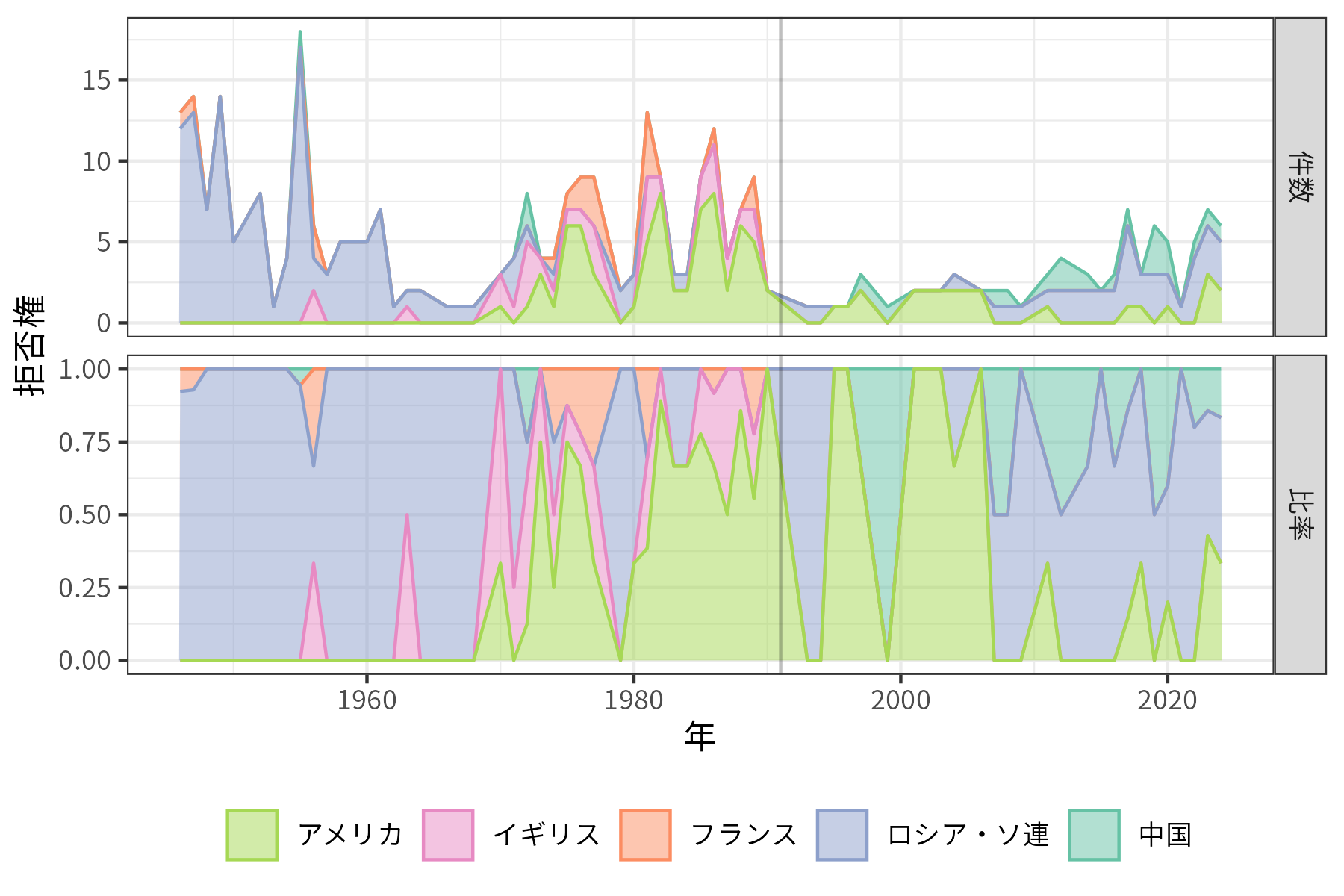
- 大国による戦争を防ぐ制度?
- 国連にしかできないこと?
平和のための結集 (Uniting for Peace) 決議/国連緊急特別総会 (emergency special session: ESS)
Resolves that if the Security Council, because of lack of unanimity of the permanent members, fails to exercise its primary responsibility for the maintenance of international peace and security in any case where there appears to be a threat to the peace, breach of the peace, or act of aggression, the General Assembly shall consider the matter immediately with a view to making appropriate recommendations to Members for collective measures, including in the case of a breach of the peace or act of aggression the use of armed force when necessary, to maintain or restore international peace and security.
平和維持活動 (peacekeeping operation)
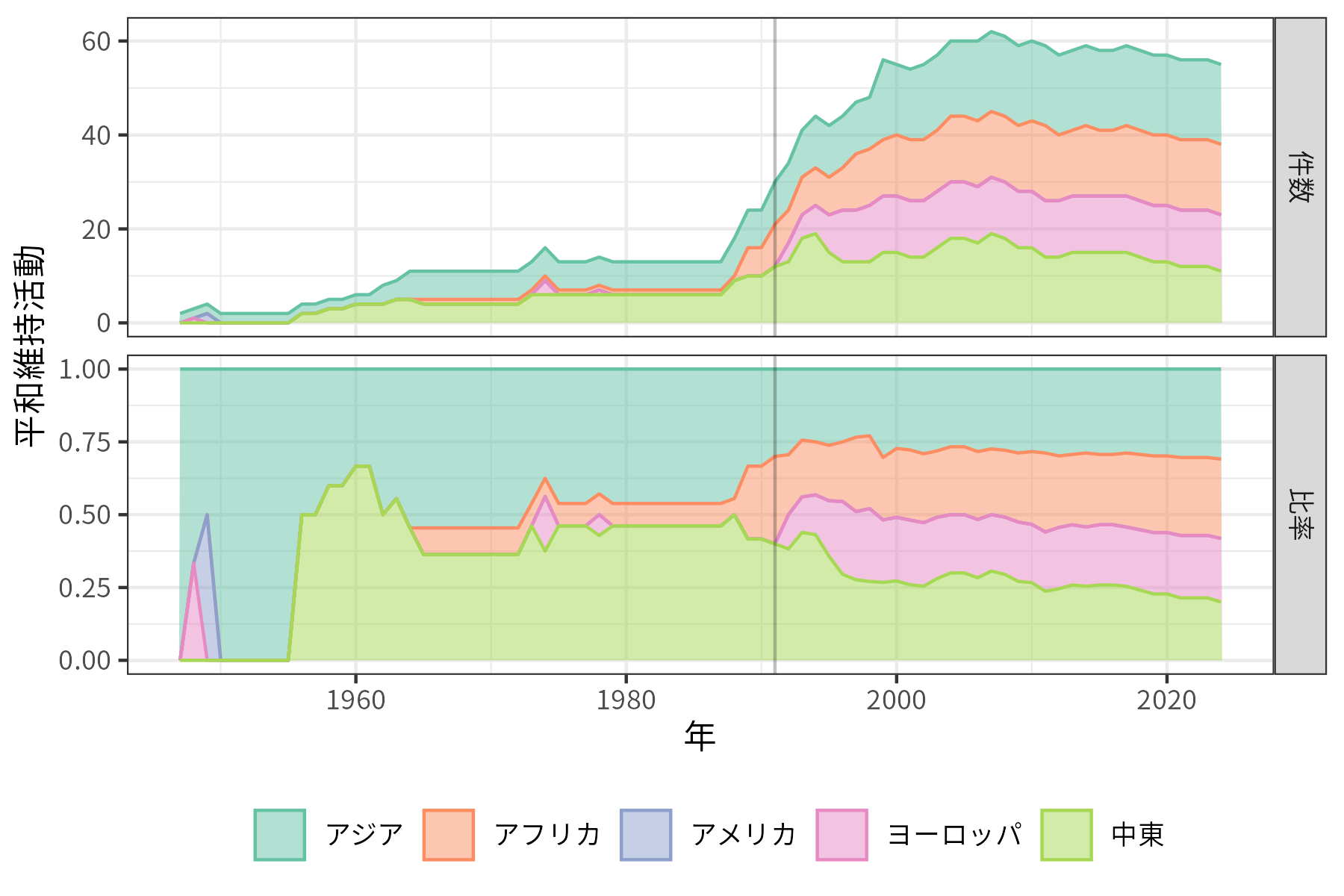
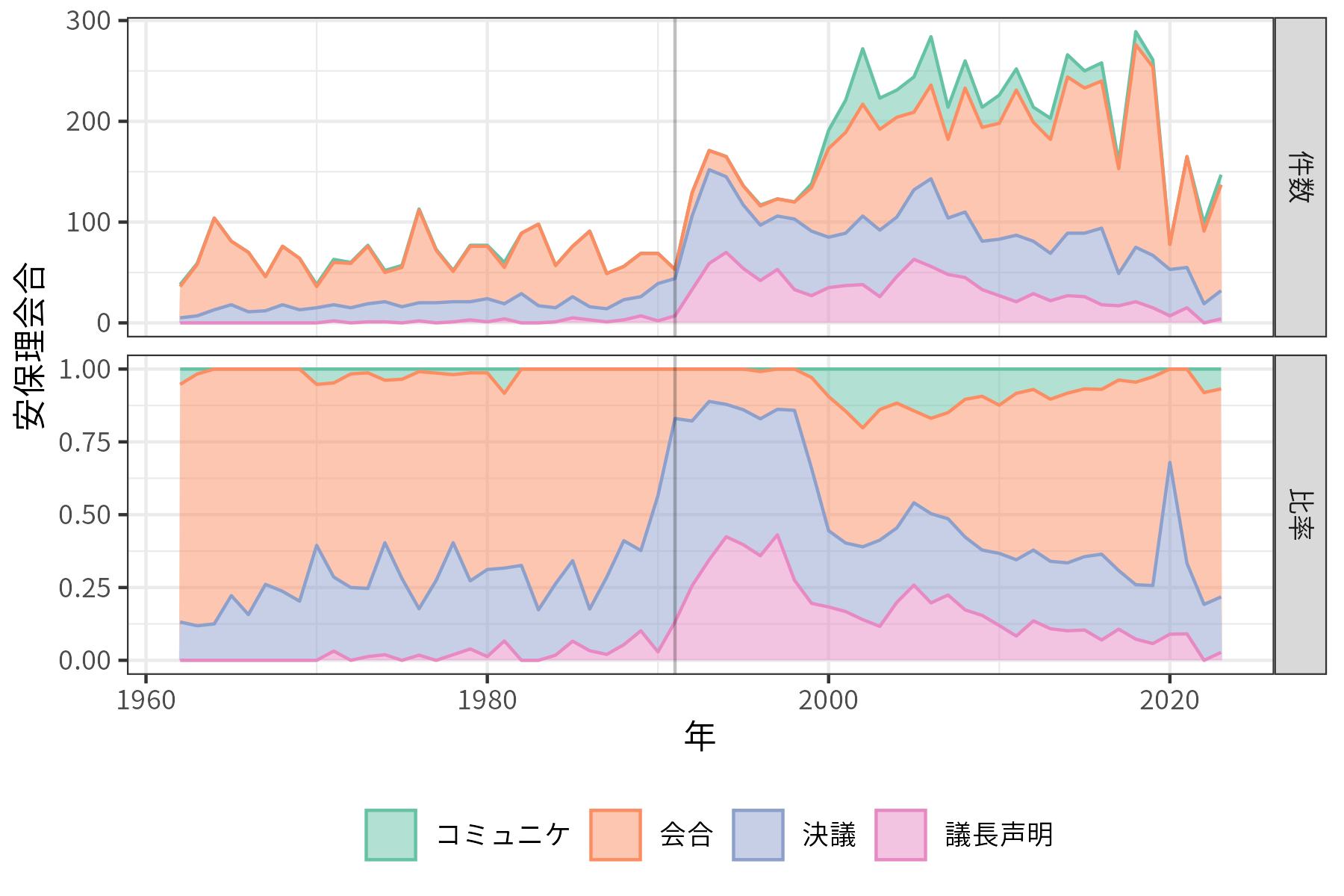
湾岸戦争/安保理決議678
The Security Council,
Recalling and reaffirming its resolutions 660 (1990) of 2 August 1990, 661 (1990) of 6 August 1990, 662 (1990) of 9 August 1990, 664 (1990) of 18 August 1990, 665 (1990) of 25 August 1990, 666 (1990) of 13 September 1990, 667 (1990) of 16 September 1990, 669 (1990) of 24 September 1990, 670 (1990) of 25 September 1990, 674 (1990) of of 29 October 1990 and 677 (1990) of 28 November 1990.
Noting that, despite all efforts by the United Nations, Iraq refuses to comply with its obligation to implement resolution 660 (1990) and the above-mentioned subsequent relevant resolutions, in flagrant contempt of the Security Council,
Mindful of its duties and responsibilities under the Charter of the United Nations for the maintenance and preservation of international peace and security,
Determined to secure full compliance with its decisions,
Acting under Chapter VII of the Charter,
Demands that Iraq comply fully with resolution 660 (1990) and all subsequent relevant resolutions, and decides, while maintaining all its decisions, to allow Iraq one final opportunity, as a pause of goodwil, to do so;
Authorizes Member States co-operating with the Government of Kuwait, unless Iraq on or before 15 January 1991 fully implements, as set forth in paragraph 1 above, the above-mentioned resolutions, to use all necessary means to uphold and implement resolution 660 (1990) and all subsequent relevant resolutions and to restore international peace and security in the area;
Requests all States to provide appropriate support for the actions undertaken in pursuance of paragraph 2 of the present resolution;
Requests the States concerned to keep the Security Council regularly informed on the progress of actions undertaken pursuant to paragraphs 2 and 3 of the present resolution;
Decides to remain seized of the matter.
6.3 民主主義による平和
単一アクター (unitary actor) 仮定
6.3.1 民主的平和
民主的平和 (democratic peace: DP)
- 民主主義のデータ:Polity 5/V-Dem
- 競争的権威主義、選挙権威主義(Gandhi と Lust-Okar 2009)2
- 権威主義国のパフォーマンス?3
- 民主主義の後退 (democracy backsliding)
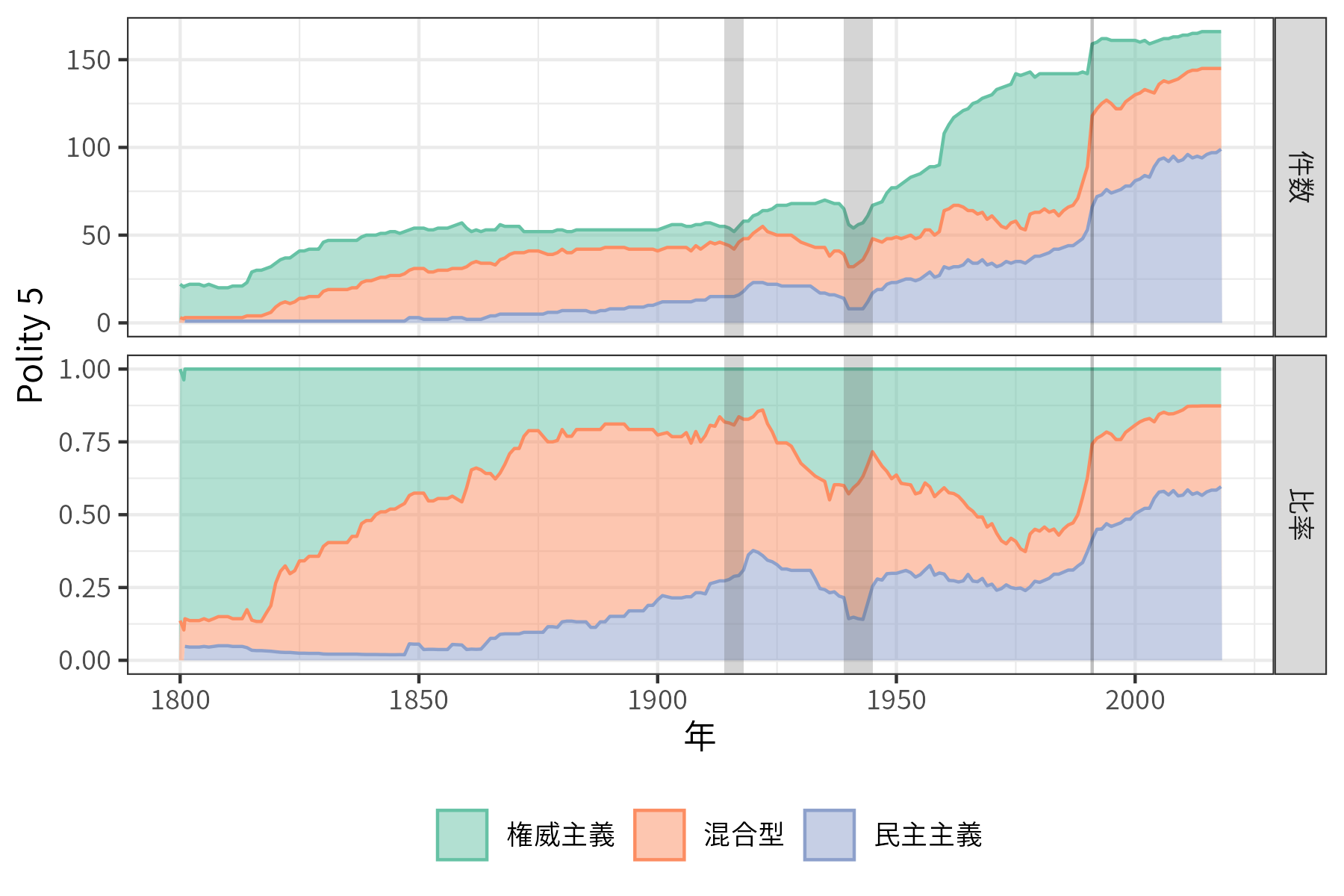
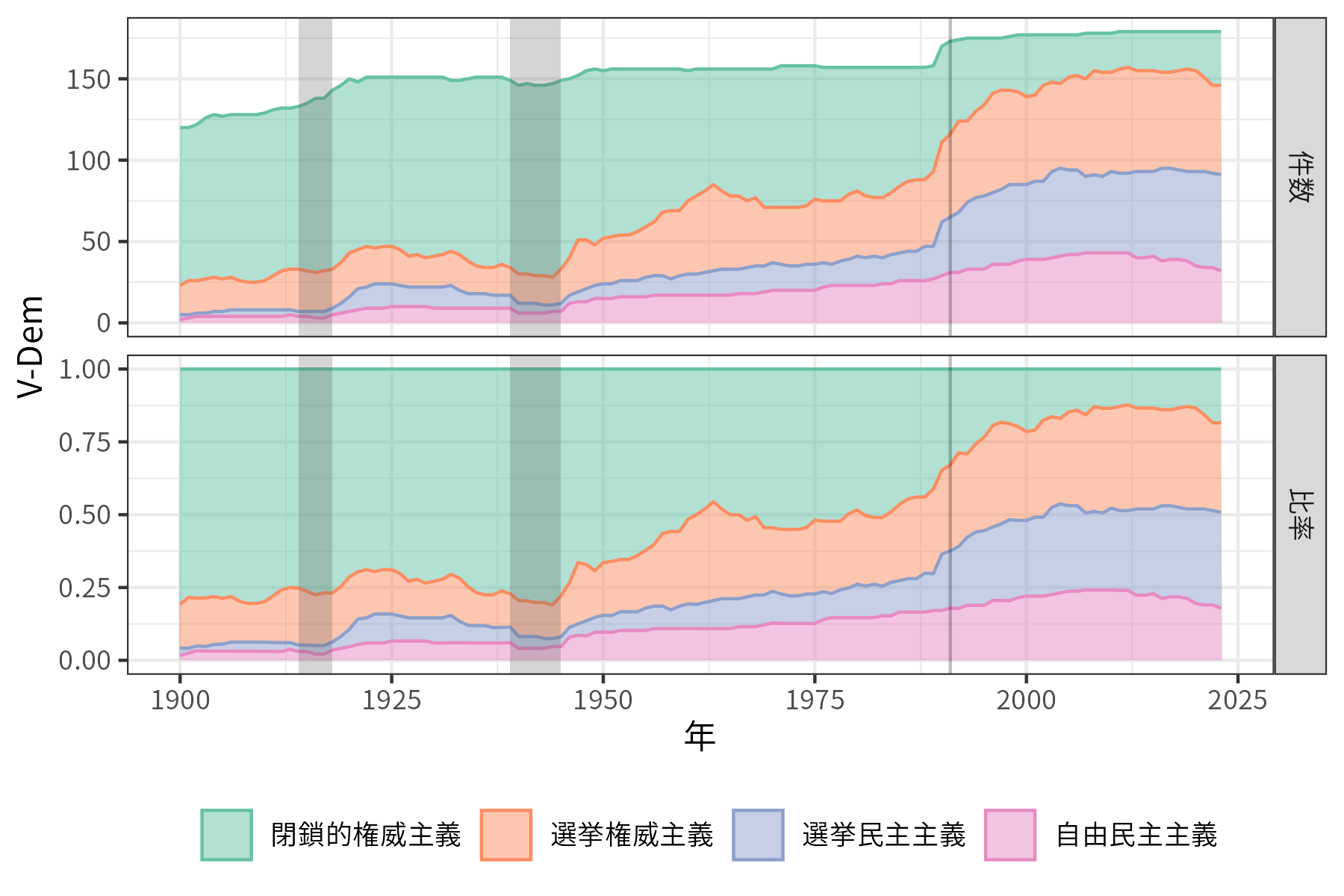
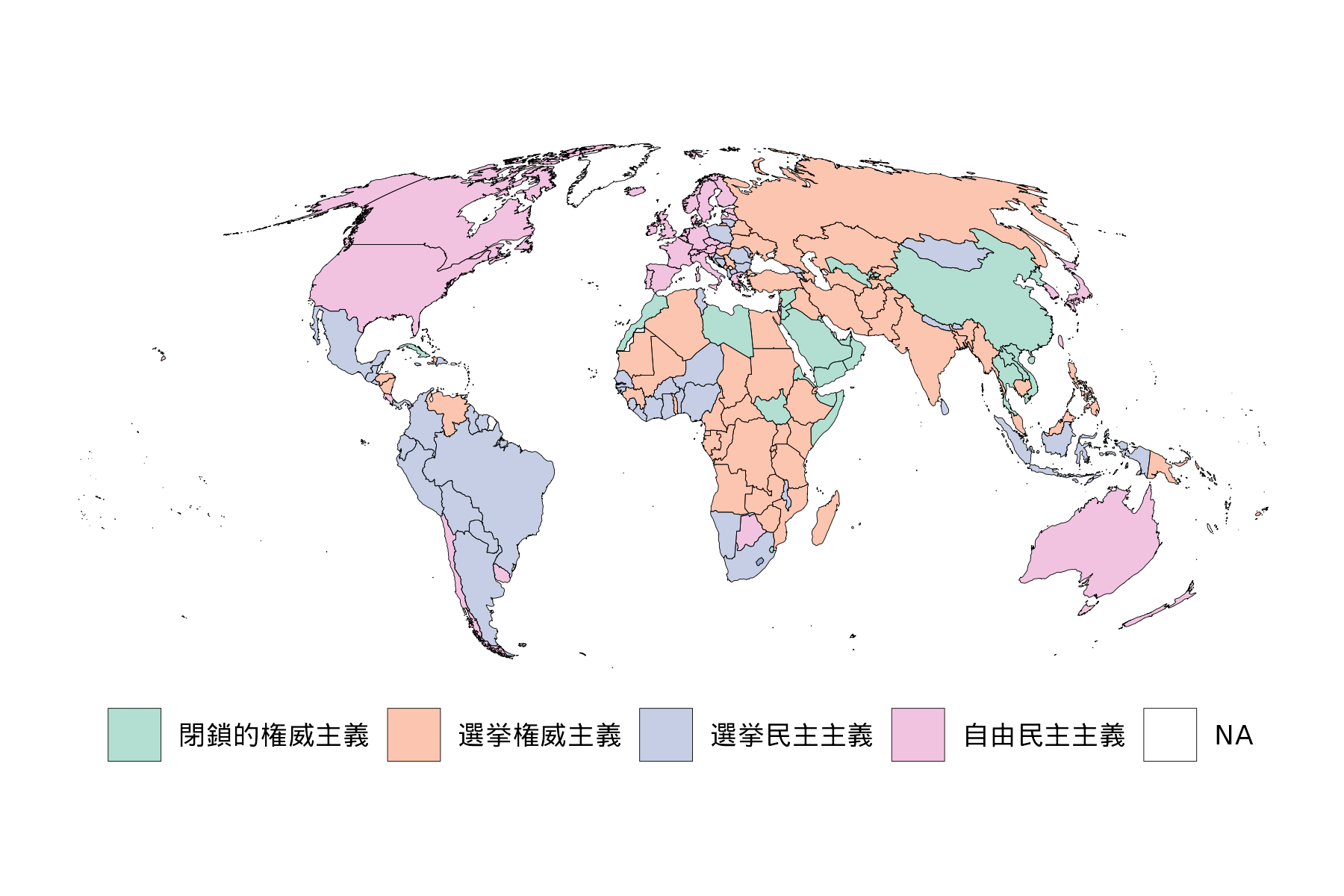
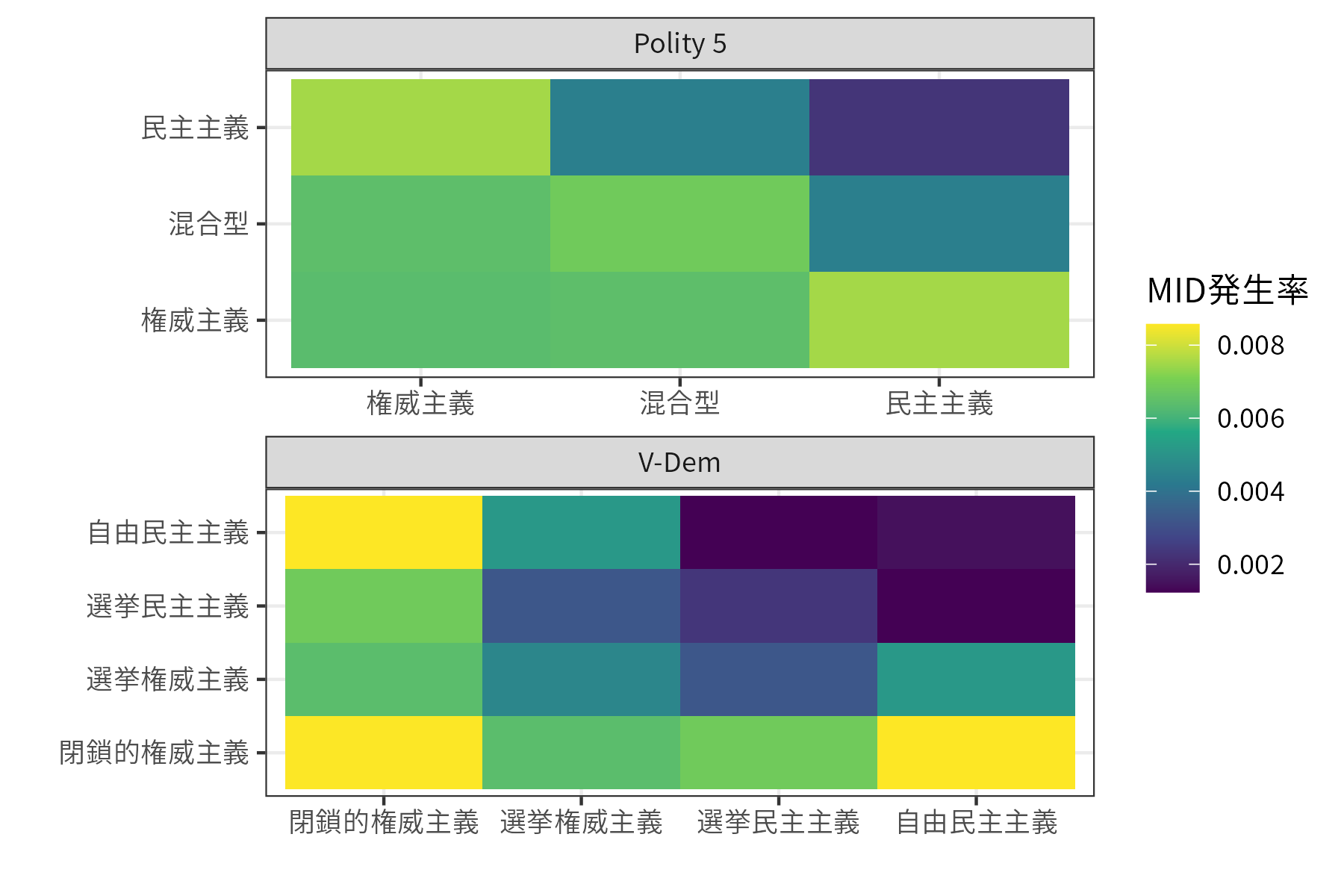
6.3.2 民主的平和の論理
- アカウンタビリティ
- 権威主義国による攻撃(Reiter と Stam 2003)
- (指導者の)政治的生き残り(Bueno de Mesquita ほか 2013)
- 独裁者の末路(Goemans 2008)
- 情報の非対称性
- 報道の自由(Van Belle 1997)/与野党の議論(Schultz 1998)
- 観衆費用(Fearon 1994)
- 観衆費用の存在(M. Tomz 2007; Kurizaki と Whang 2015)
- 観衆費用の不在(Snyder と Borghard 2011; Trachtenberg 2012; Katagiri と Min 2019)
- 権威主義国における観衆費用(Weiss 2013; Weeks 2008)
- 民主主義国による威嚇の信憑性の低さ(Downes と Sechser 2012)
- 透明性(Finel と Lord 1999)
- 憲法9条
- 規範/アイデンティティ/信頼(Doyle 1986; Risse-Kappen 1995)
- 妥協(Mousseau 1998; Dixon 1994)
- 市民の態度(M. R. Tomz と Weeks 2013)
- 体制間競争?
- 女性政治家
- ジェンダー平等/女性議員/女性参政権と軍事支出/武力行使(Reiter 2015; Barnhart ほか 2020)
- 女性指導者と武力紛争(Koch と Fulton 2011; Caprioli と Boyer 2001)
- 指導者になる女性(Schramm と Stark 2020)
- 平和的な姿勢?(Schwartz と Blair 2020)
6.3.3 民意と戦争
旗下結集効果 (rally [’round the flag] effect)/陽動戦争 (diversionary war)/復活のためのギャンブル (gambling for resurrection)
- テロリズムの効果(Godefroidt 2023)
- 国際危機と政治的生き残り(Chiozza と Goemans 2003)
暗殺の影響(Jones と Olken 2009)
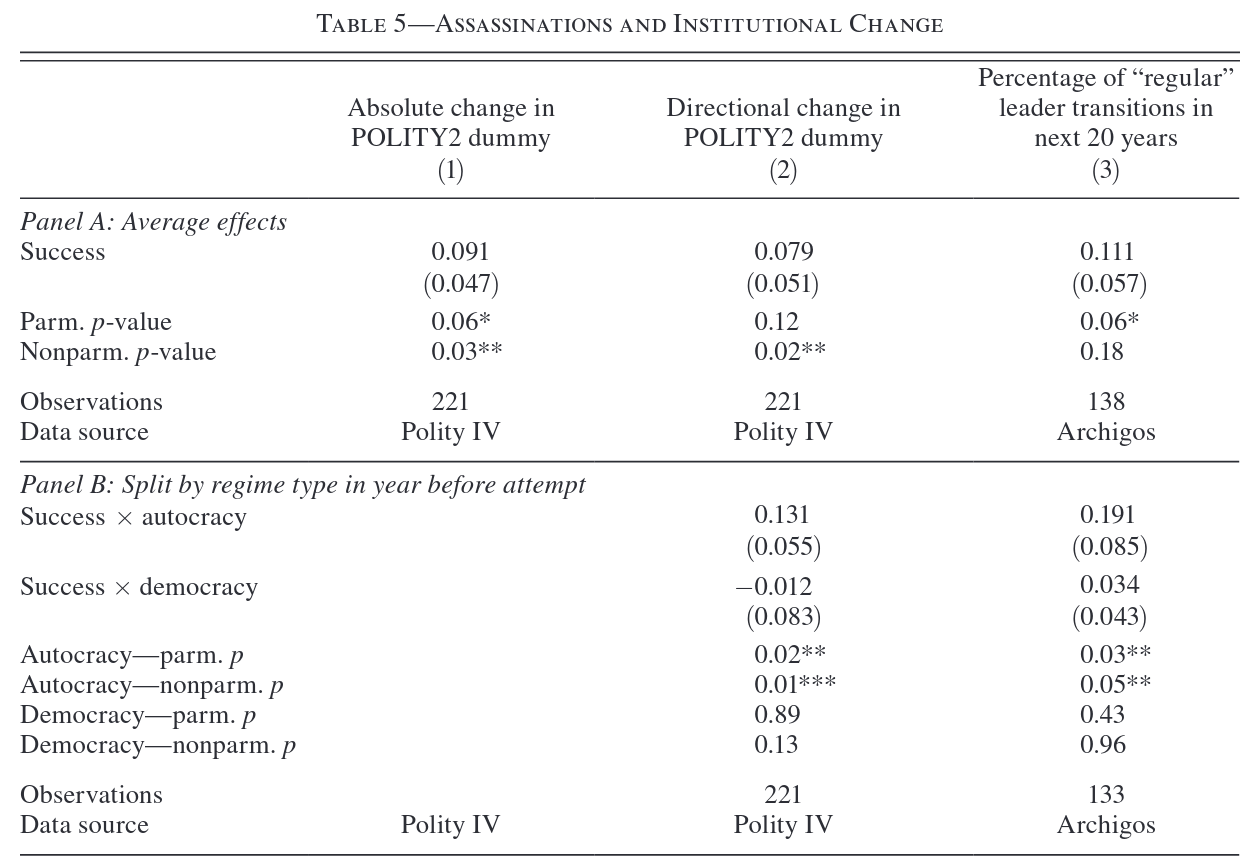
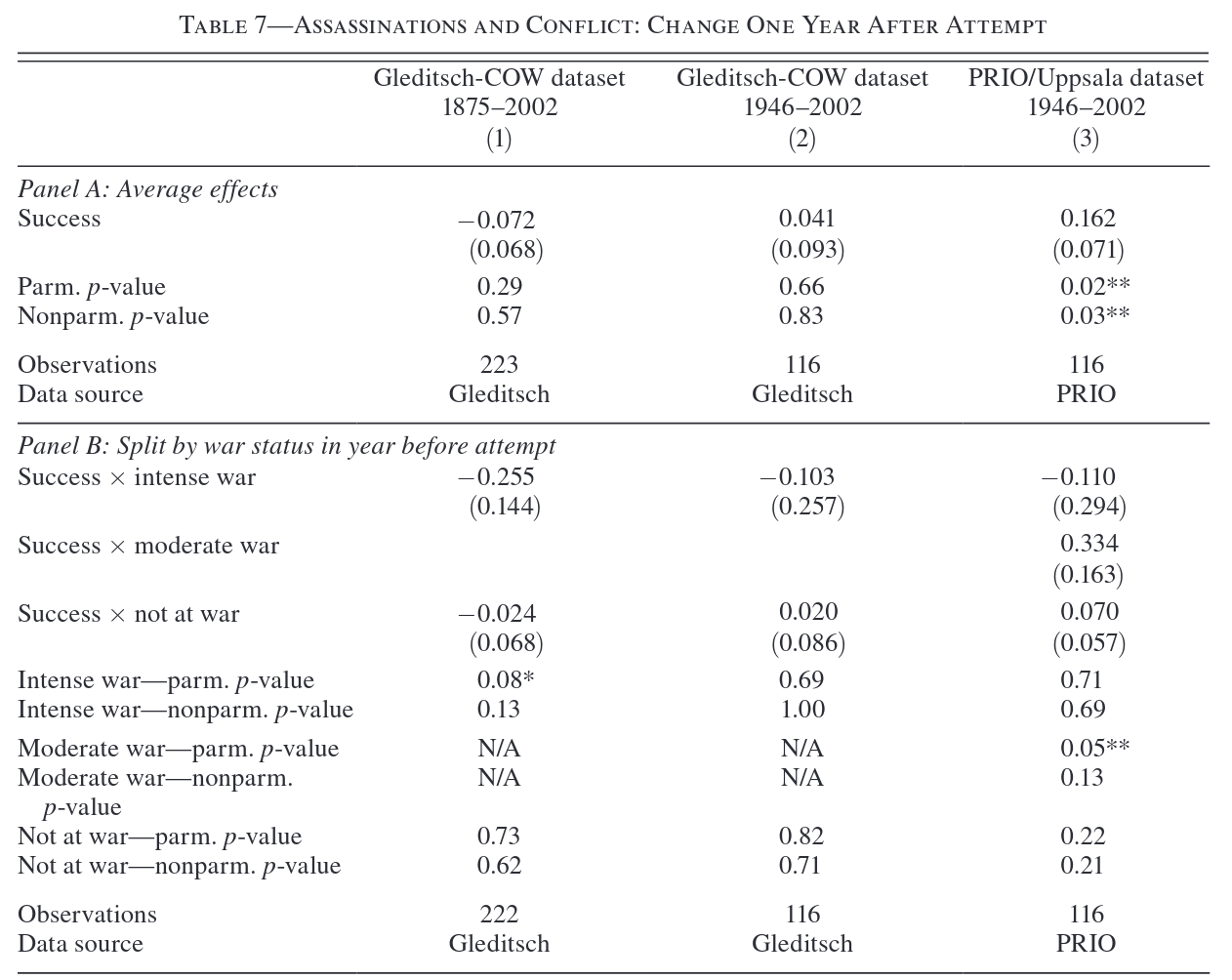
6.3.4 民主化による平和
相関\(\neq\)因果
- 自由市場経済(Gartzke 2007)
- 領土問題(Thompson 1996; Gibler と Tir 2010, 2014)
- 共通の脅威(Farber と Gowa 1997; McDonald 2015)
民主化\(\leadsto\)平和?
- 新興民主主義国や民主化と紛争(Mansfield と Snyder 1995)
6.4 経済による平和
商業的平和 (commercial peace):戦争の機会費用
経済的国策 (economic statecraft)、経済的威圧 (economic coersion)、経済安全保障 (economic security)
参考文献
カントの「永遠平和のために」がこうした思想の潮流とする見方のため。↩︎
東島雅晶「恐怖支配から恩寵政治へ? 権威主義体制の変貌する統治手法」(2022) 中央公論;浅古泰史・東島雅昌「「民主主義 vs. 権威主義」のゆくえ」(2022) 経済セミナー10・11月号↩︎
東島雅晶「民主主義と権威主義、どちらの「社会経済パフォーマンス」が上なのか? データ分析が示す驚きの結果」(2022) 現代ビジネス;安中進「民主主義は権威主義に劣るのか? : コロナ禍における政治体制の実証分析」(2021) 中央公論;安中進「政治体制は豊かさや健康にどのような影響を及ぼすのか?」(2022) 経済セミナー10・11月号↩︎





